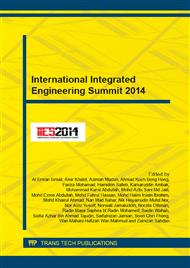p.501
p.506
p.511
p.520
p.525
p.530
p.535
p.540
p.545
Experimental Investigation of Standard Handling and Storage Duration on Fuel Properties, Appearance, Burning Process and Emissions of Biodegradable Alternative Fuel
Abstract:
Concern shortage and limited of petroleum, bio-fuels or also known as alternative fuel offer an advantage in order to sustain in long terms and economical. This renewable source is a good offer as an improvement attempt of automobile fuel and burner combustion. The main issue in using biodegradable alternative fuel such as vegetable oil-based fuels is oxidation stability, stoichiometric point, bio-fuel composition, antioxidants on the degradation and much oxygen with comparing to diesel gas oil. Thus, this study investigated the effects of different kind of biodegradable alternative fuel tested at variant in storage ambient condition under different storage duration. These tests were performed on the biodegradable alternative fuel such crude palm oil (CPO), and waste cooking oil (WCO) with different of ambient temperature and variant of blending ratio. The biodegradable fuel samples were stored in clinical compartment, at different temperatures and were monitored at regular interval over a period of 60 days. Blending of biodiesel was varied from 5vol% ~ 15vol% and storage temperature from 5°C~33°C. The effects of ambient temperature and storage duration on properties of biodegradable fuel such as density, kinematics viscosity, acid value, water content and flash point of biodiesel were discussed in detail. Analysis of this study showed that the different storage duration gave a significant effect toward the changes of water content; acid value and viscosity. As a conclusion, a long period of storage would decrease the quality of biodiesel no matter what kind of condition and environment is exposed to.
Info:
Periodical:
Pages:
525-529
Citation:
Online since:
July 2015
Authors:
Keywords:
Permissions:
Share:
Citation:


